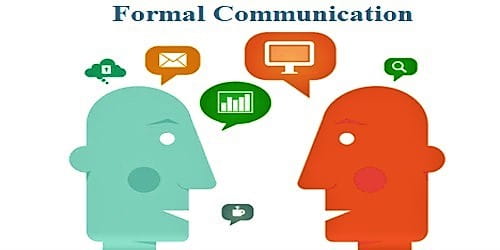‘Formal Communication’ refers to the flow of information throughout a planned pathway in a formal organization. The principle of this communication is to give orders, convey instructions and accomplish the objective of the organization through some pre-determined rules and regulations.
Limitations / Disadvantages of Formal Communication
Though formal communication helps organizations in various ways, it is not free from limitations. Major limitations/disadvantages of formal communication are discussed below:
- Wastage of Time
Formal communication procedure passes through a variety of stages or levels of an organization and consequently requires more time to attain its goal. Through formal channel of communication, messages reach to its ultimate destination passing various levels of hierarchy. At every level, messages are encoded and decoded for transmitting it at the next level. Top level management communicates with their employees by maintaining the board of succession, not by-passing any administrative or any level. That is why it takes a lot of time and it wastages much time of the concerned person. This is eventually wastage of time. As a result, the communication process becomes lengthy that wastes time.
- Lack of flexibility
Another major drawback of formal communication is that it is not flexible. Ordinarily, the formal communication is inflexible. If somebody out of the channel intends to change his views it is not possible. Through formal communication, it is not possible to transmit an emergency message as it follows formal rules, regulations, and authority structure. Even when it is needed to change, it is very much difficult. It is a rigid form of communication as makeup or change cannot be considered easily when required.
- Authoritarian attitude
Formal communication states the plain connection between higher level management and junior level management. When superiors initiate formal communication, it becomes authoritarian in nature. Through this communication, superiors tend to dictate the subordinates that may negatively affect their morale. In this system, the sender is a higher authority and the receiver is lower staffs. Usually, the superior’s order cannot be disobeyed. It creates a controlling culture in the organization. When there is a descending communication, there is a controlling tone to rule lower level employees.
- Lack of personal creativity and initiative
In such communication, there is no alternative to choose any other method which is the best one compared to the prescribed system. Formal communication does not allow any violation of prescribed channels, rules and regulations. None can use alternative way even though it seems better than the established procedure. Under this communication method, everybody does their responsibility by following specific predestined organism. So it makes the barrier to develop the creativeness of the employee. As a result, creative ideas are overlooked here. As a result, there is no chance of showing personal creativity and initiative for better communication.
- Lack of personal relation
As formal communication occurs by following predetermined rules and regulations, there is little scope to develop personal relationships among the concerned parties. In this communication system, the subsidiary staffs severely follow the order of higher authority. So the implementer of the order does not obey their duty suitably.
- Costly
In this system, the organization strategy and rules are obeyed accurately. Sometimes it creates critical condition and it is a time being an aspect. Formal communication requires following prescribed rules, regulations, and formalities. Consequently, a huge amount of money is required to prepare those rules, regulations, and formalities. For these, the cost of a formal communication system is superior to those of others. This sort of communication maintains all formalities of communication for which it involves more cost.
Delay in declaim asking
Due to excessive formality, a formal communication process requires a long time in reaching a message to its destination. Compliance with the formalities may bring discipline in an organization but it wastes time and causes the delay in decision making. Everyone has to keep up a particular structure of communication in case of formal communication. Therefore management requires more time which delays decision making procedure.
Finally, it can be said that despite having some problems, formal communication is regarded as the officially recognized communication system. Survival and success of business organizations mostly depend on effective formal communication. Therefore, concerned parties should try their best to make effective formal communication.














